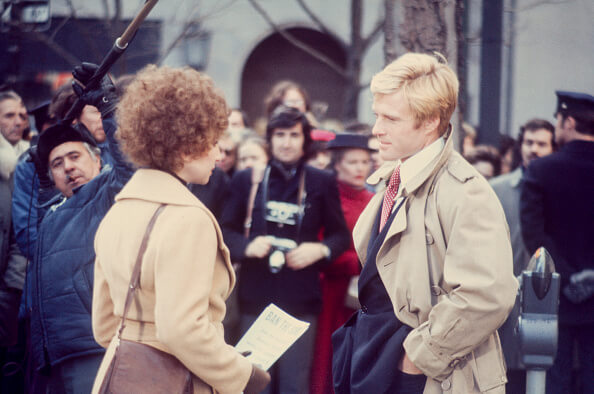Robert Redford’s legacy is surprisingly Jewish
The actor and director shared the screen with Dustin Hoffman, Barbra Streisand and Paul Newman

Robert Redford and Barbra Streisand filming The Way We Were. Photo by Art Zelin/Getty Images
Robert Redford, the actor, director and film festival visionary, has died at 89.
Remembered for his ruddy good looks, accomplished pivot to directing and help ushering the film industry into its independent era by spearheading the Sundance Film Festival, Redford embodied an age. That age was one of increasingly visible Jewishness in film, and Redford often stood in as the visibly gentile foil.
Beginning his career in New York City, Redford, a California native, starred on Broadway as an anxious newlywed in Neil Simon’s Barefoot in the Park, and later reprised the role in the 1967 film. The movie, helmed by Gene Saks, was a hit, but Redford’s cachet as a film star came later.
In 1969, Redford had his breakout role in Butch Cassidy and the Sundance Kid, playing the quickdraw counterpart to Paul Newman’s Butch Cassidy. In a stretch for Redford, who learned to surf as a kid on Hermosa Beach, Sundance couldn’t swim. (William Goldman wrote the script, as he did for five Redford vehicles.)
Redford and Newman’s relationship continued with director George Roy Hill in 1973’s The Sting — the pair switched mustache duty — with a ragtime score adapted by Marvin Hamlisch.
That same year, Redford played opposite Barbra Streisand in The Way We Were, also featuring music by Hamlisch, who won three Oscars in 1974 split between the two films.
“Redford and I were very different on the surface,” Streisand recalled in The Way They Were, a recent history of the film. “I was raised in a Jewish family in Brooklyn, playing skelly with bottle caps in the street. He was the blond, suntanned California guy, surfing and riding horses — while I was afraid of them. But inside, we were alike: shy, sensitive, and both of us appreciated the mystery of relationships.”
The doomed relationship in the film, directed by Sydney Pollack, remains an iconic touchstone in Redford’s career. Pollack, the son of Jewish immigrants, would direct Redford in seven of his 21 films.
Perhaps Redford’s best-recalled Jewish-Gentile teamup was in All The President’s Men, in which he played Bob Woodward opposite Dustin Hoffman’s Carl Bernstein, breaking open the Watergate scandal. The two were so simpatico, they were said to have learned each other’s lines so they could interrupt one another in William Goldman’s dialogue.
In 1980, Redford directed Ordinary People, Alvin Sargent’s adaptation of Judith Guest’s novel about a grieving, WASPy family. Judd Hirsch starred as a Jewish psychiatrist, earning him an Oscar nomination. Redford won best director.
Redford’s filmography as a director was decidedly mixed, but an Oscar-nominated highlight was 1994’s Quiz Show, about a 1950s scandal in which NBC positioned a well-to-do WASP to beat out a working-class Jew.
While Redford couldn’t help but present as what he was — razor-jawed, scotch-Irish — he made a gripping indictment of a TV studio’s efforts to elevate someone who looked more like him than one of his many Jewish co-stars. (For what it’s worth, when they had to cast Bernard Malamud’s all-American slugger in The Natural, Barry Levinson got Redford in the role.)
Redford announced his retirement from acting in 2018. While one of the most dependable leading men in movies, he never won an Oscar for acting. But his 2002 honorary Academy Award for his work with the Sundance Film Festival may be the greater tribute to his legacy.
The filmmakers who emerged from the festival are a litany of household names, but two, from its early years under Redford, stand out.
In 1985, a neo-noir debut feature set in Texas took home the grand jury prize. It was called Blood Simple, and while credited to one director, Joel Coen, it was truly a collaboration with his brother, Ethan.
















